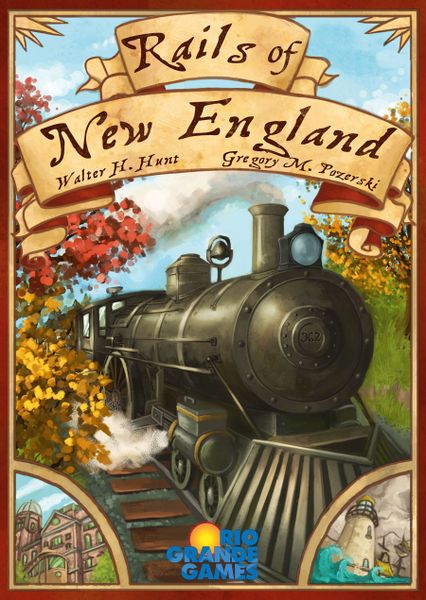Rails of New England (2011) Board Game
Rails of New England: Brief History and Background Information
Rails of New England is a board game released in 2011 designed by Ryan Laukat and published by Rio Grande Games. This game is set in the early 19th century and focuses on players building railroads to connect various cities in the New England region. The game is categorized as an economic and industry/manufacturing game, with mechanics involving network and route building, as well as open drafting.
Brief History and Background Information for Rails of New England
Rails of New England takes players back to the early days of railroad development in the New England region. Players take on the roles of railroad tycoons, competing to build the most profitable railroad network. The game captures the essence of the industrial revolution and the strategic planning required to succeed in the railroad industry.
Game Components of Rails of New England
- Game board depicting the New England region
- Railroad tokens representing different players
- City tiles representing cities to be connected
- Resource cards for building railroads
- Money tokens for economic transactions
- Rulebook for gameplay instructions
How To Setup Rails of New England
- Place the game board in the center of the table.
- Shuffle the city tiles and place them face down on designated spaces on the board.
- Each player selects a color and takes the corresponding railroad tokens and resource cards.
- Determine the starting player and begin the game.
Gameplay Mechanics and Game Objective
In Rails of New England, players take turns building railroad tracks to connect cities and earn money. The objective is to build the most profitable railroad network by connecting cities efficiently and strategically. Players must manage resources effectively and plan their routes carefully to outmaneuver opponents and maximize profits.
Player Experience
Pros:
- Strategic gameplay with multiple paths to victory
- Engaging theme and historical setting
- Opportunity for player interaction and competition
Cons:
- Lengthy runtime of 180 minutes may deter casual players
- Steep learning curve for new players
- Limited player count of 2-5 may not accommodate larger gaming groups
Personal Thoughts on Rails of New England
Rails of New England offers a deep and immersive experience for players interested in economic and industry/manufacturing games. The strategic depth and historical setting add to the game’s appeal, making it a worthwhile choice for fans of railroad-themed games. However, the lengthy runtime and steep learning curve may be off-putting for some players. The game’s build quality is solid, and it is priced reasonably for the components and gameplay it offers. For those looking for alternatives or similar games, titles like Ticket to Ride or Age of Steam may offer a different take on railroad-themed gameplay. Overall, Rails of New England is worth considering for players who enjoy strategic planning and railroad management games, but it may not be suitable for those seeking a quick or casual gaming experience.
Game Components of Rails of New England
How To Setup Rails of New England
To set up the game, each player chooses a state to represent, starting with Connecticut and New Hampshire for two players, and adding Vermont for three players, and so on. Each player begins with two or three businesses under their control. The event deck is shuffled, and the first five events, which are fixed historical events, are placed on the board. The remaining events are randomized into a face-down deck. Players also receive initial cash and resources.
Gameplay Mechanics and Game Objective
Mechanics:
Game Objective:
Player Experience
Players experience a dynamic economic environment set in 19th-century New England. Each round involves forecasting economic conditions, managing events, drafting cards, and taking actions to build and connect businesses. The game progresses through different time periods, introducing new types of businesses and requiring players to make strategic decisions about which businesses to maintain or make obsolete. The game demands a balance between short-term gains and long-term strategic planning.
Pros
Cons
Personal Thoughts on Rails of New England
Rails of New England is ideal for experienced board game enthusiasts who enjoy economic and strategic gameplay. It is particularly suited for those interested in historical themes and complex game mechanics. While it may not be the best choice for casual gamers or those new to board games, it offers a rich and engaging experience for those willing to invest the time and effort into mastering its intricacies.
We are supported by our audience. When you purchase through links on our site, we may earn an affiliate commission, at no extra cost for you. Learn more.

